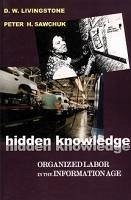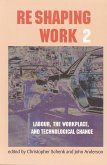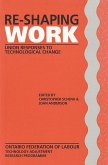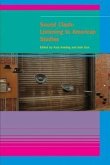- Broschiertes Buch
- Merkliste
- Auf die Merkliste
- Bewerten Bewerten
- Teilen
- Produkt teilen
- Produkterinnerung
- Produkterinnerung
Working people are more knowledgeable and actively engaged in learning than public discussion generally assumes. Two basic assumptions underlie much recent discussion about work and learning: a new "knowledge-based economy" is quickly emerging with new jobs generally requiring greater knowledge and skill; and, a "lifelong learning culture" must be created in order for workers to cope with these employment-related knowledge demands. Virtually every recent public policy statement about employment in every advanced industrial country begins with these assumptions. It implies that most workers…mehr
Andere Kunden interessierten sich auch für
![Re-Shaping Work 2 Re-Shaping Work 2]() Re-Shaping Work 233,99 €
Re-Shaping Work 233,99 €![Re-Shaping Work Re-Shaping Work]() Re-Shaping Work22,99 €
Re-Shaping Work22,99 €![Aircraft Stories Aircraft Stories]() John LawAircraft Stories41,99 €
John LawAircraft Stories41,99 €![Sound Clash Sound Clash]() Sound Clash44,99 €
Sound Clash44,99 €![Rising Above the Gathering Storm Rising Above the Gathering Storm]() Institute Of MedicineRising Above the Gathering Storm72,99 €
Institute Of MedicineRising Above the Gathering Storm72,99 €![The Hidden Variables Theory The Hidden Variables Theory]() Israel FriedThe Hidden Variables Theory23,99 €
Israel FriedThe Hidden Variables Theory23,99 €![Envisioning a 21st Century Science and Engineering Workforce for the United States Envisioning a 21st Century Science and Engineering Workforce for the United States]() National Academy Of SciencesEnvisioning a 21st Century Science and Engineering Workforce for the United States40,99 €
National Academy Of SciencesEnvisioning a 21st Century Science and Engineering Workforce for the United States40,99 €-
-
-
Working people are more knowledgeable and actively engaged in learning than public discussion generally assumes. Two basic assumptions underlie much recent discussion about work and learning: a new "knowledge-based economy" is quickly emerging with new jobs generally requiring greater knowledge and skill; and, a "lifelong learning culture" must be created in order for workers to cope with these employment-related knowledge demands. Virtually every recent public policy statement about employment in every advanced industrial country begins with these assumptions. It implies that most workers suffer from a deficit of necessary skills and knowledge which must be rectified by greater education and training efforts. Hidden Knowledge challenges these assumptions. Through life history interviews and case study research with union members, the actual learning practices of working class people are documented in unprecedented detail. Published Under the Garamond Imprint Available in the US through Rowman & Littlefield.
Hinweis: Dieser Artikel kann nur an eine deutsche Lieferadresse ausgeliefert werden.
Hinweis: Dieser Artikel kann nur an eine deutsche Lieferadresse ausgeliefert werden.
Produktdetails
- Produktdetails
- Verlag: University of Toronto Press
- Seitenzahl: 320
- Erscheinungstermin: 1. Oktober 2003
- Englisch
- Abmessung: 229mm x 152mm x 18mm
- Gewicht: 440g
- ISBN-13: 9781551930459
- ISBN-10: 1551930455
- Artikelnr.: 53687438
- Herstellerkennzeichnung
- Libri GmbH
- Europaallee 1
- 36244 Bad Hersfeld
- gpsr@libri.de
- Verlag: University of Toronto Press
- Seitenzahl: 320
- Erscheinungstermin: 1. Oktober 2003
- Englisch
- Abmessung: 229mm x 152mm x 18mm
- Gewicht: 440g
- ISBN-13: 9781551930459
- ISBN-10: 1551930455
- Artikelnr.: 53687438
- Herstellerkennzeichnung
- Libri GmbH
- Europaallee 1
- 36244 Bad Hersfeld
- gpsr@libri.de
By D.W. Livingstone and Peter Sawchuk
"
Acknowledgements
Introduction: Dimensions of Learning and Work in the Knowledge Society
Spheres of Work and Learning
Class and Learning
Working-class Underemployment
Information Access in the Computer Era
Sector-based Research Sites
Chapter Outlines
Part I: Researching Learning and Work
Chapter 1: Starting with Workers and Researching the ""Hard Way""
Introduction
Research Methods
Democratic Knowledge Production: The Importance of Social Standpoint
Concluding Remarks
Chapter 2: Beyond Cultural Capital Theories: Hidden Dimensions of
Working-class Learning
Introduction
The Cultural Capital Bias
The Rediscovery of Creative Working-class Culture
Critical Review of Major Theories of Adult Learning
Origins of Cultural Historical Activity Theory
Activity Theory from Vygotsky to the Present
CHAT from a Working-class Standpoint
Patriarchal, Racist and Ageist Effects on Working-class Learning
Concluding Remarks
Part II: Case Studies
Chapter 3: Auto Workers: Lean Manufacturing and Rich Learning
Introduction
The General Motors Site in Oshawa, Ontario
The CAW and Local 222
Tightening Labour Markets and Worker Rebellion
Working in the Auto Plant: ""It doesn't take a genius""
Formal Schooling and Job Training
Informal on the Job Training: ""You're pretty much on your own""
Union-based Education Programs
Informal Learning in Local 222
Cultural Historical Dimensions of Auto Workers' Learning
Concluding Remarks
Chapter 4: Builiding a Workers' Learning Culture in the Chemical Industry
Introduction
Profile of Workforce and Interviewees
A Profile of Learning Amongst Chemical Workers
Union-based Learning
The Cultural Historical Dimensions of Learning Amongst Chemical Workers
Chemical Workers' Learning and the Class Bias of Knowledge
Struggle over Knowledge and Credentials at the Chemical Factory
Challenging Existing Structures / Introducing New Ones
Concluding Remarks
Chapter 5: Learning, Restructuring, and Job Segregation at a Community
College
Introduction
Working at the College
Learning at the College
Restructuring, Work and Learning in a College Setting
Bumping and Mulit-tasking: The Reality of Work and Learning for College
Workers under Restructuring
Segregation Processes at the College
Comparing Learning Across Groups
Concluding Remarks
Chapter 6: Divisions of Labour/Divisions of Learning in a Small Parts
Manufacturer
Introduction
Research Overview and Participant Profile
Profile of a Learning in a Small Parts Plant
The Divisions of Learning at Work
Concluding Remarks
Chapter 7: Garment Workers: Learning Under Disruption
Introduction
Union Survival Response
Profile of the Workforce
Job Disruption and Stress
Organization of Garment Sector Training
A Profile of Learning in the Garment Sector
Cultural Historical Dimensions of Garment Workers' Learning
Concluding remarks
Part III: Comparative Perspectives Across Case Studies
Chapter 8: Household and Community-based Learning: Learning Cultures and
Class Differences Beyond Paid Work
Introduction
Home- and Community-based Learning Histories
The Connections Between Economic Restructuring and Home and Community Life
The Distribution of Free Time and Learning in the Home
""I can't think of anything, can you?"": The Invisibility of Working-class
Learning in the Home
Working-class Community Living and Learning
Family-based Union Learning
Concluding Remarks
Chapter 9: Surfacing the Hidden Dimensions of the Knowledge Society: The
Struggle for Knowledge Across Differences
Uses of Formal Schooling, Organized Training and Informal Learning Across
the Sites
Gender, Race and Age Effects on Workers' Learning
Recommendations
Concluding Remarks
Appendix: Interviewee Profiles
References
Index
"
Acknowledgements
Introduction: Dimensions of Learning and Work in the Knowledge Society
Spheres of Work and Learning
Class and Learning
Working-class Underemployment
Information Access in the Computer Era
Sector-based Research Sites
Chapter Outlines
Part I: Researching Learning and Work
Chapter 1: Starting with Workers and Researching the ""Hard Way""
Introduction
Research Methods
Democratic Knowledge Production: The Importance of Social Standpoint
Concluding Remarks
Chapter 2: Beyond Cultural Capital Theories: Hidden Dimensions of
Working-class Learning
Introduction
The Cultural Capital Bias
The Rediscovery of Creative Working-class Culture
Critical Review of Major Theories of Adult Learning
Origins of Cultural Historical Activity Theory
Activity Theory from Vygotsky to the Present
CHAT from a Working-class Standpoint
Patriarchal, Racist and Ageist Effects on Working-class Learning
Concluding Remarks
Part II: Case Studies
Chapter 3: Auto Workers: Lean Manufacturing and Rich Learning
Introduction
The General Motors Site in Oshawa, Ontario
The CAW and Local 222
Tightening Labour Markets and Worker Rebellion
Working in the Auto Plant: ""It doesn't take a genius""
Formal Schooling and Job Training
Informal on the Job Training: ""You're pretty much on your own""
Union-based Education Programs
Informal Learning in Local 222
Cultural Historical Dimensions of Auto Workers' Learning
Concluding Remarks
Chapter 4: Builiding a Workers' Learning Culture in the Chemical Industry
Introduction
Profile of Workforce and Interviewees
A Profile of Learning Amongst Chemical Workers
Union-based Learning
The Cultural Historical Dimensions of Learning Amongst Chemical Workers
Chemical Workers' Learning and the Class Bias of Knowledge
Struggle over Knowledge and Credentials at the Chemical Factory
Challenging Existing Structures / Introducing New Ones
Concluding Remarks
Chapter 5: Learning, Restructuring, and Job Segregation at a Community
College
Introduction
Working at the College
Learning at the College
Restructuring, Work and Learning in a College Setting
Bumping and Mulit-tasking: The Reality of Work and Learning for College
Workers under Restructuring
Segregation Processes at the College
Comparing Learning Across Groups
Concluding Remarks
Chapter 6: Divisions of Labour/Divisions of Learning in a Small Parts
Manufacturer
Introduction
Research Overview and Participant Profile
Profile of a Learning in a Small Parts Plant
The Divisions of Learning at Work
Concluding Remarks
Chapter 7: Garment Workers: Learning Under Disruption
Introduction
Union Survival Response
Profile of the Workforce
Job Disruption and Stress
Organization of Garment Sector Training
A Profile of Learning in the Garment Sector
Cultural Historical Dimensions of Garment Workers' Learning
Concluding remarks
Part III: Comparative Perspectives Across Case Studies
Chapter 8: Household and Community-based Learning: Learning Cultures and
Class Differences Beyond Paid Work
Introduction
Home- and Community-based Learning Histories
The Connections Between Economic Restructuring and Home and Community Life
The Distribution of Free Time and Learning in the Home
""I can't think of anything, can you?"": The Invisibility of Working-class
Learning in the Home
Working-class Community Living and Learning
Family-based Union Learning
Concluding Remarks
Chapter 9: Surfacing the Hidden Dimensions of the Knowledge Society: The
Struggle for Knowledge Across Differences
Uses of Formal Schooling, Organized Training and Informal Learning Across
the Sites
Gender, Race and Age Effects on Workers' Learning
Recommendations
Concluding Remarks
Appendix: Interviewee Profiles
References
Index
"
"
Acknowledgements
Introduction: Dimensions of Learning and Work in the Knowledge Society
Spheres of Work and Learning
Class and Learning
Working-class Underemployment
Information Access in the Computer Era
Sector-based Research Sites
Chapter Outlines
Part I: Researching Learning and Work
Chapter 1: Starting with Workers and Researching the ""Hard Way""
Introduction
Research Methods
Democratic Knowledge Production: The Importance of Social Standpoint
Concluding Remarks
Chapter 2: Beyond Cultural Capital Theories: Hidden Dimensions of
Working-class Learning
Introduction
The Cultural Capital Bias
The Rediscovery of Creative Working-class Culture
Critical Review of Major Theories of Adult Learning
Origins of Cultural Historical Activity Theory
Activity Theory from Vygotsky to the Present
CHAT from a Working-class Standpoint
Patriarchal, Racist and Ageist Effects on Working-class Learning
Concluding Remarks
Part II: Case Studies
Chapter 3: Auto Workers: Lean Manufacturing and Rich Learning
Introduction
The General Motors Site in Oshawa, Ontario
The CAW and Local 222
Tightening Labour Markets and Worker Rebellion
Working in the Auto Plant: ""It doesn't take a genius""
Formal Schooling and Job Training
Informal on the Job Training: ""You're pretty much on your own""
Union-based Education Programs
Informal Learning in Local 222
Cultural Historical Dimensions of Auto Workers' Learning
Concluding Remarks
Chapter 4: Builiding a Workers' Learning Culture in the Chemical Industry
Introduction
Profile of Workforce and Interviewees
A Profile of Learning Amongst Chemical Workers
Union-based Learning
The Cultural Historical Dimensions of Learning Amongst Chemical Workers
Chemical Workers' Learning and the Class Bias of Knowledge
Struggle over Knowledge and Credentials at the Chemical Factory
Challenging Existing Structures / Introducing New Ones
Concluding Remarks
Chapter 5: Learning, Restructuring, and Job Segregation at a Community
College
Introduction
Working at the College
Learning at the College
Restructuring, Work and Learning in a College Setting
Bumping and Mulit-tasking: The Reality of Work and Learning for College
Workers under Restructuring
Segregation Processes at the College
Comparing Learning Across Groups
Concluding Remarks
Chapter 6: Divisions of Labour/Divisions of Learning in a Small Parts
Manufacturer
Introduction
Research Overview and Participant Profile
Profile of a Learning in a Small Parts Plant
The Divisions of Learning at Work
Concluding Remarks
Chapter 7: Garment Workers: Learning Under Disruption
Introduction
Union Survival Response
Profile of the Workforce
Job Disruption and Stress
Organization of Garment Sector Training
A Profile of Learning in the Garment Sector
Cultural Historical Dimensions of Garment Workers' Learning
Concluding remarks
Part III: Comparative Perspectives Across Case Studies
Chapter 8: Household and Community-based Learning: Learning Cultures and
Class Differences Beyond Paid Work
Introduction
Home- and Community-based Learning Histories
The Connections Between Economic Restructuring and Home and Community Life
The Distribution of Free Time and Learning in the Home
""I can't think of anything, can you?"": The Invisibility of Working-class
Learning in the Home
Working-class Community Living and Learning
Family-based Union Learning
Concluding Remarks
Chapter 9: Surfacing the Hidden Dimensions of the Knowledge Society: The
Struggle for Knowledge Across Differences
Uses of Formal Schooling, Organized Training and Informal Learning Across
the Sites
Gender, Race and Age Effects on Workers' Learning
Recommendations
Concluding Remarks
Appendix: Interviewee Profiles
References
Index
"
Acknowledgements
Introduction: Dimensions of Learning and Work in the Knowledge Society
Spheres of Work and Learning
Class and Learning
Working-class Underemployment
Information Access in the Computer Era
Sector-based Research Sites
Chapter Outlines
Part I: Researching Learning and Work
Chapter 1: Starting with Workers and Researching the ""Hard Way""
Introduction
Research Methods
Democratic Knowledge Production: The Importance of Social Standpoint
Concluding Remarks
Chapter 2: Beyond Cultural Capital Theories: Hidden Dimensions of
Working-class Learning
Introduction
The Cultural Capital Bias
The Rediscovery of Creative Working-class Culture
Critical Review of Major Theories of Adult Learning
Origins of Cultural Historical Activity Theory
Activity Theory from Vygotsky to the Present
CHAT from a Working-class Standpoint
Patriarchal, Racist and Ageist Effects on Working-class Learning
Concluding Remarks
Part II: Case Studies
Chapter 3: Auto Workers: Lean Manufacturing and Rich Learning
Introduction
The General Motors Site in Oshawa, Ontario
The CAW and Local 222
Tightening Labour Markets and Worker Rebellion
Working in the Auto Plant: ""It doesn't take a genius""
Formal Schooling and Job Training
Informal on the Job Training: ""You're pretty much on your own""
Union-based Education Programs
Informal Learning in Local 222
Cultural Historical Dimensions of Auto Workers' Learning
Concluding Remarks
Chapter 4: Builiding a Workers' Learning Culture in the Chemical Industry
Introduction
Profile of Workforce and Interviewees
A Profile of Learning Amongst Chemical Workers
Union-based Learning
The Cultural Historical Dimensions of Learning Amongst Chemical Workers
Chemical Workers' Learning and the Class Bias of Knowledge
Struggle over Knowledge and Credentials at the Chemical Factory
Challenging Existing Structures / Introducing New Ones
Concluding Remarks
Chapter 5: Learning, Restructuring, and Job Segregation at a Community
College
Introduction
Working at the College
Learning at the College
Restructuring, Work and Learning in a College Setting
Bumping and Mulit-tasking: The Reality of Work and Learning for College
Workers under Restructuring
Segregation Processes at the College
Comparing Learning Across Groups
Concluding Remarks
Chapter 6: Divisions of Labour/Divisions of Learning in a Small Parts
Manufacturer
Introduction
Research Overview and Participant Profile
Profile of a Learning in a Small Parts Plant
The Divisions of Learning at Work
Concluding Remarks
Chapter 7: Garment Workers: Learning Under Disruption
Introduction
Union Survival Response
Profile of the Workforce
Job Disruption and Stress
Organization of Garment Sector Training
A Profile of Learning in the Garment Sector
Cultural Historical Dimensions of Garment Workers' Learning
Concluding remarks
Part III: Comparative Perspectives Across Case Studies
Chapter 8: Household and Community-based Learning: Learning Cultures and
Class Differences Beyond Paid Work
Introduction
Home- and Community-based Learning Histories
The Connections Between Economic Restructuring and Home and Community Life
The Distribution of Free Time and Learning in the Home
""I can't think of anything, can you?"": The Invisibility of Working-class
Learning in the Home
Working-class Community Living and Learning
Family-based Union Learning
Concluding Remarks
Chapter 9: Surfacing the Hidden Dimensions of the Knowledge Society: The
Struggle for Knowledge Across Differences
Uses of Formal Schooling, Organized Training and Informal Learning Across
the Sites
Gender, Race and Age Effects on Workers' Learning
Recommendations
Concluding Remarks
Appendix: Interviewee Profiles
References
Index
"








